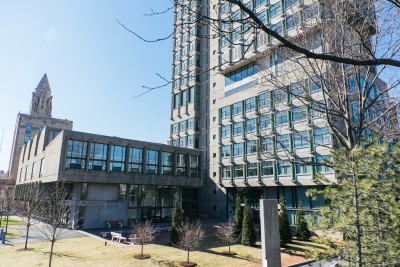
Boston University School of Law graduate Thomas Smith created an endowment to further fund the School of Law’s Spring Break Pro Bono Service Trips, according to a Monday release.
Inspired by the spirit of the program, Smith and his wife Sharon established the Thomas Royall Smith and Sharon L. Smith Crisis Advocacy Fund in order to allow School of Law students “help communities in crises,” the release stated.
“We were moved by the idea of creating a crisis advocacy fund,” Smith, a 1970 alum, stated in the release. “In this way, we can support BU Law students helping to respond to crisis situations, the most recent being the water crisis in Flint, Michigan.”
The support and vision of the Smiths’ fund will provide future School of Law students the opportunity to respond to nationwide crises situations, such as providing a “much-needed legal assistance,” the release stated.
Zachary Dubin, the senior leadership gifts officer at the School of Law, said the recently established crisis advocacy fund looks toward the future of law students.
“It’s more of a forward-looking thing,” he said. “In a few years, [it will] provide support for certain types of trips that fall under the Pro Bono Program.”
Due to the nature of the endowment system, the gift will not immediately fund trips, Dubin explained. However, it does create a hopeful future.
“It gives the school a better understanding of what our budget can be for certain programs,” he said. “It’s not going to have an impact on our current students just yet.”
According to Dubin, many other School of Law alums have been inspired to give back to the law school.
“Right now, the law school is in the middle of a $100 million campaign that runs through 2019,” he said.
In a follow-up email, Dubin wrote that, “as of the beginning of this month, we have raised $63,660,012 of the $100 [million] campaign goal.”
Furthermore, as of June 2015, there were “964 first-time donors to the Law Fund,” Dubin added.
The School of Law’s Pro Bono Program was inspired by and established during the aftermath of Hurricane Katrina, and it allows students to work with several nonprofit organizations all over the country on a spring break service trip. The goal of the trip is to help residents of low-income communities, said Carolyn Goodwin, the School of Law’s director of public service and pro bono.
Students can be placed in their home communities or in the Boston area to best meet the needs of different communities around the country, Goodwin said.
“We will also place students nationally and in Boston, in areas where they have accommodations already,” she said. “But we organize the placements for them so they can contribute to the communities in which they live or in the Boston community.”
Goodwin said the Pro Bono Program’s service trips are competitive, with around 50 spots every year.
“It’s a competitive application process where students will submit an application form, an essay and other information, and a committee reviews the application and chooses the students,” Goodwin said. “Last year, we had a total of 52 students.”
The trips are funded by both the law school and by the students, Goodwin said.
Several School of Law students spoke positively about their experiences and perceptions of the Pro Bono Program’s spring break service.
Jordan Shockett, a second-year School of Law student, went on a Pro Bono trip back in 2015, during which he helped Hurricane Katrina victims with legal work regarding their houses.
“It was great,” he said. “I was able to work with these people and hopefully get them to have their houses rebuilt.”
Ruben Sanchez, a second-year School of Law student, commented that the Smiths’ endowment would positively impact enrollment in the program.
“I think you’ll see an increase in enrollment because right now it costs $500 per student, which is still subsidized and cheap, but law students don’t have money,” he said. “So to go less than [$]500, I think you’ll see an increase in enrollment.”
Camille Ramos-Klee, a third-year School of Law student, said she would definitely go on a trip if she wasn’t graduating this year.
“It seems like a great opportunity for me,” she said. “I’m from Minnesota, so I have to come from far away. But if there are trips within Minneapolis or in the St. Paul area, I would definitely participate.”
A previous version of this story named the School of Law’s Director of Public service and Pro Bono Carolyn Goodman, instead of Carolyn Goodwin. This correction is reflected in the story above.




